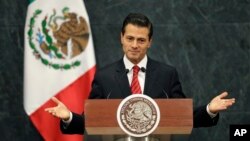Mexico has an array of tools to face down financial volatility in the wake of the U.S. presidential election, Finance Minister Jose Antonio Meade said on Monday, after Donald Trump's victory sent the peso currency into a tailspin.
The government can use a windfall stemming from the Mexican central bank's foreign exchange gains on the peso, as well as some 110 billion pesos ($5.3 billion) in its oil stabilization fund, to ensure public finances are stable, Meade said.
"And we're facing this situation with well-capitalized banks," Meade said at an event in the central city of Puebla.
Trump's win sparked fears because of threats he made in the campaign to dump the 1994 North American Free Trade Agreement (NAFTA) if he could not recast it in the United States' favor, sending the peso to a record low of more than 21 per dollar.
NAFTA is a pact between the United States, Canada and Mexico, which sends 80 percent of its goods exports to the U.S. market.
Meade also noted the Mexican government had refinanced its 2017 debt maturities, meaning it can cover its financing requirements for next year in the domestic market.
"Mexico's public debt ... is something we are revising and discussing with the market," the minister said.
Speaking earlier at the same event, Mexico's Economy Minister Ildefonso Guajardo said he was sure Trump would not ditch NAFTA and noted that new chapters should be added to the trade deal to reflect economic changes over the past 20 years.
An updated NAFTA could cover e-commerce, protection of data and intellectual property in biotech medicine, promoting value chains at small- and medium-sized firms and taking a regional stand against unfair practices such as steel dumping, he added.
Mexico has in recent months slapped tariffs on Chinese steel imports, and one of Trump's top trade advisers, Dan DiMicco, former chief executive of U.S. steelmaker Nucor, has pointedly criticized China for dumping cheap steel on the world market.
If Mexico and the United States were to align policies on such issues it would chime with trade experts arguing for the NAFTA partners to pursue a more regional approach to safeguarding the competitiveness of North America.
Guajardo himself spoke of the need to defend the NAFTA region in an interview with Reuters last week.





